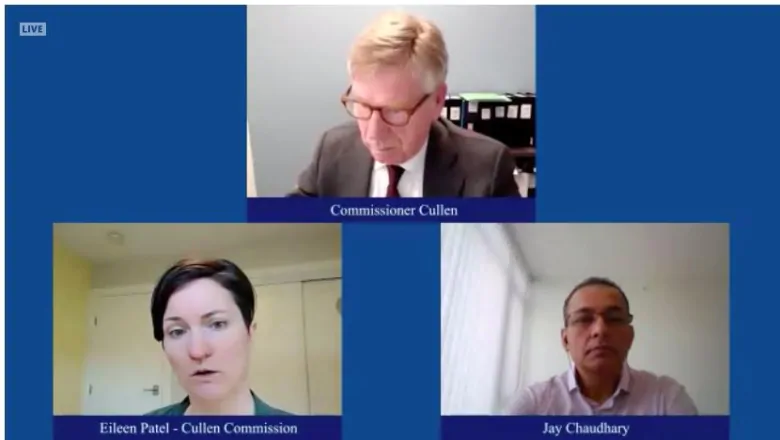A so-called unregistered “shadow” mortgage broker responsible for securing more than half a billion dollars’ worth of home financing through the use of altered tax and bank documents says there will always be a demand for the services of people with his skills.
Jay Kanth Chaudhary, who was ordered by authorities to cease and desist his unregistered activities in 2019, testified Wednesday at a public inquiry tasked with investigating money laundering in British Columbia.
He is estimated to have earned $6 million in fees related to 900 deals fronted by registered mortgage brokers in the decade before regulators raided his offices in 2018.
Speaking in front of inquiry commissioner Austin Cullen, Chaudhary characterized his role as a “moral” one in which he helped people who had the means to pay a mortgage — if not the documentation to prove it — avoid the dangerous world of private lenders.
He claimed none of his clients ever defaulted on a loan, none of the banks who gave them money were ever hurt, and a booming B.C. real estate market meant he was always busy.
“How could I have been prevented?” he asked, replying to a question from the commission’s counsel.
“In reality I don’t think it can be prevented. Because there always will be a need for individuals like us and what we did, and because the demand itself is there. The demand comes from the borrowers themselves. The demand comes from people who want a house and do not fit in the traditional guidelines.”
‘It’s not difficult’
During the course of the hearing Chaudhary’s lawyer confirmed that his client, who was summoned to appear at the commission, is under investigation by the Canada Revenue Agency.
Chaudhary worked as an accountant and was also licensed as a real estate agent before registering as a mortgage broker in January 2007.
His registration was suspended in October 2008 after a co-worker reported that he had been arranging financing using altered documents. Chaudhary never applied for reinstatement.
He told commission counsel Eileen Patel that word of mouth grew while he was a registered broker that he could arrange mortgages for people who would not normally qualify.
He said he received referrals from real estate agents and developers, and he paid the real estate agents a quarter of the roughly one per cent commission the banks would pay.
Chaudhary described making changes to statements using regular document software.
“It’s not difficult. If somebody has basic knowledge of the software, they will be able to alter it,” he said.
‘I told him the risk’
After his mortgage broker license lapsed following his suspension in 2008, Chaudhary said he went back to accounting for about six months, but he found himself struggling.
“Then the calls started to come in to see if I could still help people out to get mortgages,” he said.
“So then I decided to get into this business again, but this time just using the help of other mortgage brokers to send my applications.”

Over the next 10 years, Chaudhary said he used the services of four registered mortgage brokers to submit deals he got from a network of about 20 real estate agents who referred clients to him.
“The first mortgage broker I approached, I laid out my plan, that I had lots of clients and I would like to get mortgages done for my clients and I set out a plan that this is what I’d like to do and if he was interested,” Chaudhary said.
“He said he wanted to do it with me. I told him the risk that was involved and he was still willing to continue.”
Money for all involved
Chaudhary said it was good deal for the brokers, because he would handle all the paperwork and they only needed to submit the completed application.
He said he took 25 per cent of the commission the brokers got from the bank, and they paid him in cash. He also charged his clients one per cent of the mortgage amount.

Chaudhary said he gave the real estate agents 25 per cent of his commission from the clients.
He said he believed the people he worked with were aware of what he was doing. And he even arranged personal mortgages for a number of realtors.
The mortgage brokers he worked with have all been suspended, but Chaudhary said many of the real estate agents who funnelled customers to him are still in business.
He told Patel he used two pseudonyms to handle deals because he was concerned about competitors.
‘It never crossed my mind’
Using the example of a self-employed plumber, Chaudhary said many people earn more money than their tax records show.
Patel read from a document associated with one of his earlier files that mentioned a criminal investigation into a real estate agent accused of using a “straw buyer” to purchase houses, and an employment reference for what appeared to be a phony record company.
Chaudhary insisted that he never considered that the source of his clients’ income might be illegal activity.
“It never crossed my mind,” he said.
Chaudhary’s wife, a former real estate agent who now runs a catering company, was banned for life last October from applying to be a mortgage broker or submortgage broker for her role in facilitating her husband’s activities.
Chaudhary did not appear surprised that he had been able to operate for as long as he had.
“It seemed like the system the way I set it up, for the most part it worked well. Everyone was a winner and I also made a small fee,” he said.
“That’s why I guess there was no complaints. When everyone wins and no one gets hurt, there was no reason for anyone to complain against me.”





